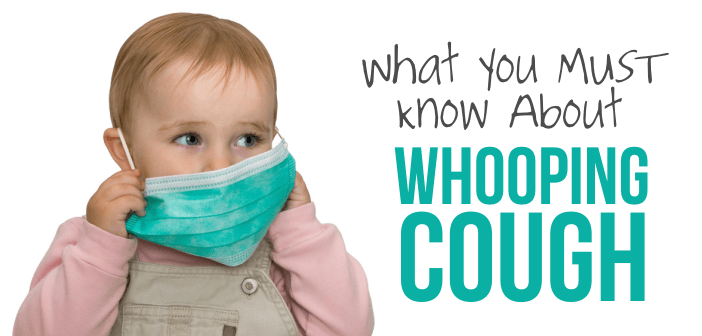This post is sponsored by NSW Health
Some of the most heart breaking footage I have watched on TV was of a little baby, only weeks old struggling to breathe between bouts of coughing in an Intensive Care Unit.
I watched the poor parents sitting helplessly beside the bed holding their daughter’s tiny hand and I imagined the trauma that they were putting themselves through wondering if they or another family member had inadvertently passed the bug on. In this case the little girl made it through and recovered but in many cases they do not.
Whooping cough (or Pertussis) is a very contagious upper respiratory tract infection. The major symptom of whooping cough is the characteristic cough, which is often followed by a ‘whooping’ sound on inhalation and 1 in every 200 babies who contract it will die. Unfortunately I know a family in our community who had the worst of outcomes. (Click here if you want a factsheet on whooping cough.)
To prevent deaths in very young infants, it is now recommended that all pregnant women receive a whooping cough vaccine at 28 weeks so that the antibodies pass to the baby in the womb. These antibodies will protect the baby before they build their own immunity through vaccination, which starts at 6 weeks of age. (For more information visit NSW Health).
When our kids were born, we knew that there was a window of time before they could be immunised and that they were vulnerable to whooping cough as well as some other things. We reduced our risk by having the adults who would come in contact with them the most (her parents, grandparents etc) immunised too because this is how most newborns contract the disease. Both sets of grandparents were hesitant to get the injections at first until we explained the consequences of passing it on (and suggested they couldn’t see their grand-kids haha)
The Tricky Bit
The main problem with whooping cough is that neither having had whooping cough itself nor being vaccinated in the past gives you long-term protection.
This means that we see big outbreaks of whooping cough every three or four years – NSW experienced large outbreaks in 2011/12 and again in 2015, with over 12,000 cases reported. Most of those cases were in school aged children. In primary school children whooping cough gives them an annoying, persistent cough (that can last for months), often worse at night. However the main concern with whooping cough in children of this age is that they are often in contact with small babies, so it’s important that their whooping cough infection is diagnosed and treated early to reduce the risk of it spreading to others.
When cases are detected in a school it’s common to alert all parents so that they can be on the lookout for early symptoms (runny nose and cough), and get their children to the GP for testing and treatment as soon as possible. If you do suspect whooping cough in your child make sure they don’t get near small babies until they are tested and (if they have whooping cough), have had at least 5 days of antibiotics to render them non-infectious.
Even though protection from vaccination isn’t long-lasting, the best thing we can all do is stay up to date with our whooping cough vaccinations. This is particularly important if you or your family are around small babies. The primary course of whooping cough vaccine is given at 6 weeks, 4 months and 6 months of age (in combination with protection against several other diseases. – Once this course is complete babies are unlikely to get severe disease if they do catch whooping cough. A new free booster at 18 months of age is being introduced to the schedule in early 2016. Other boosters are due at 4 years, 12 years and 50 years of age. All adults aged over 65 years of age require a booster dose if 10 years have passed since their last dose, and all adults that will be around new babies are also recommended to have a booster if they haven’t had one in the past 10 years. If you are unsure, please discuss your vaccination needs with your doctor.
Director of NSW Health Communicable Diseases Branch, Dr Vicky Sheppeard, said recent outbreaks in NSW of measles and whooping cough put babies and young children at most risk.
“Babies do get some immunity from their mums, but until they are old enough to get their own course of vaccinations it’s important that everyone around baby is fully immunised to prevent exposing her to dangerous diseases.”
Amazing Phone App
 With the increased push to link immunisation with things like family tax benefits and child care rebates etc (see https://www.dss.gov.au/our-responsibilities/families-and-children/benefits-payments/strengthening-immunisation-for-young-children), there are now both health and financial benefits to making sure that your children are keeping up with the recommended schedule.
With the increased push to link immunisation with things like family tax benefits and child care rebates etc (see https://www.dss.gov.au/our-responsibilities/families-and-children/benefits-payments/strengthening-immunisation-for-young-children), there are now both health and financial benefits to making sure that your children are keeping up with the recommended schedule.
NSW Health’s Save the Date to Vaccinate App helps parents to know when the various immunisations are due – giving you a tool to overcome one of the top reasons children aren’t immunised on time. You simply enter your child’s date of birth etc into the app and you will receive notifications when it’s time to make an appointment for the various needles etc.
You can find out all about the “Save The Date” smart phone app here: (link – https://www.immunisation.health.nsw.gov.au/). This is super handy if you have several children. The app even gives you the opportunity to book with your doctor when you need to.
So download the app, and remember that adults and children need to make sure that they are current with their whooping cough immunisations before being around newborns and anyone else vulnerable to this deadly disease.

